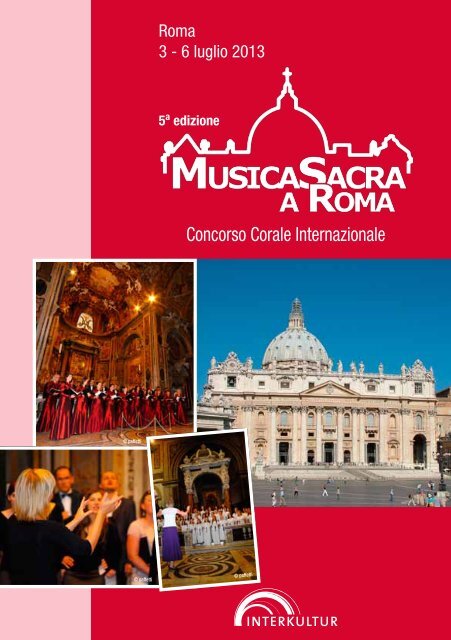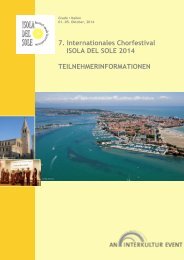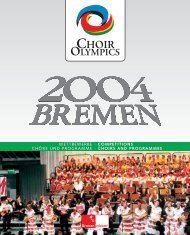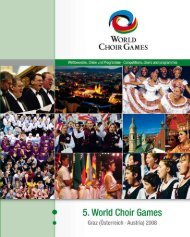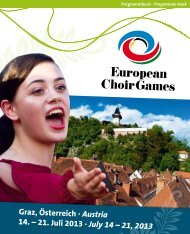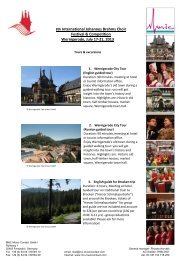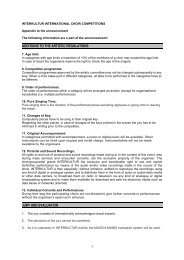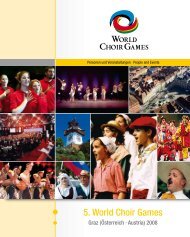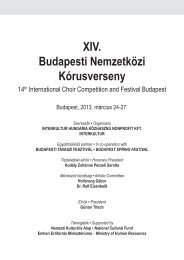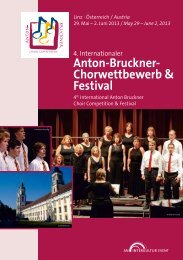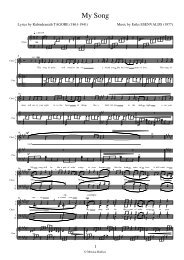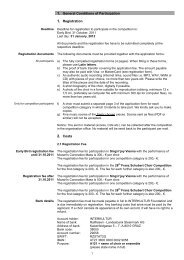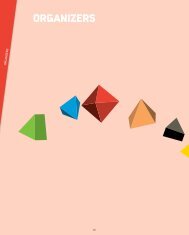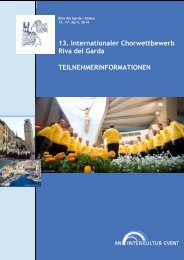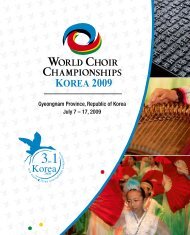Concorso Corale Internazionale - interkultur.com
Concorso Corale Internazionale - interkultur.com
Concorso Corale Internazionale - interkultur.com
You also want an ePaper? Increase the reach of your titles
YUMPU automatically turns print PDFs into web optimized ePapers that Google loves.
Roma<br />
3 - 6 luglio 2013<br />
5 a edizione<br />
<strong>Concorso</strong> <strong>Corale</strong> <strong>Internazionale</strong><br />
© paffetti<br />
© paffetti<br />
© paffetti
3<br />
5° <strong>Concorso</strong> corale internazionale<br />
“Musica Sacra a Roma”, Roma, 3 - 6 luglio 2013<br />
Organizzatori - Organizers<br />
INTERKULTUR e.V. Germany<br />
Associazione Ex Alunni Padri Trinitari, Roma<br />
In collaborazione con - In cooperation with<br />
Ordine della Santissima Trinità, Roma<br />
Patrocinio - Patronage<br />
Pontificio Istituto di Musica Sacra, Roma<br />
Presidente di INTERKULTUR - President of INTERKULTUR<br />
Günter Titsch (Germania - Germany)<br />
Comitato Esecutivo Interkultur - Interkultur Board<br />
Stefan Bohländer (Germania - Germany)<br />
Prof. Dr. Ralf Eisenbeiß (Germania - Germany)<br />
Gábor Hollerung (Ungheria – Hungary)<br />
Piroska Horváth (Ungheria - Hungary)<br />
Günter Titsch (Germania - Germany)<br />
Qin Wang (Cina – China)<br />
Comitato artistico - Artistic <strong>com</strong>mittee<br />
Prof. Dr. Ralf Eisenbeiß (Germania - Germany)<br />
Gábor Hollerung (Ungheria - Hungary)<br />
M° Aurelio Porfiri (Italia - Italy)<br />
Event manager<br />
Piroska Horváth (Ungheria - Hungary)<br />
Presidenza onoraria - Honorary Presidency<br />
Rev.mo Mons. M° Valentino Miserachs Grau<br />
(Preside emerito del Pontificio Istituto di Musica Sacra,<br />
Maestro di Cappella della Basilica di S. Maria Maggiore in Roma)<br />
(Honorary Dean of the Pontifical Institute of Sacred Music,<br />
Choirmaster of Saint Mary Major Basilica in Rome)<br />
Musica Sacra a Roma
4<br />
Indice - Table of Contents<br />
Nazionalità dei cori partecipanti - Nationality of participating choirs pag. 5<br />
Saluti - Greetings pag. 6<br />
Organizzatori - Organizers pag. 10<br />
Comitato artistico - Artistic <strong>com</strong>mittee pag. 18<br />
Giuria - Jury pag. 24<br />
Programma generale - General schedule pag. 34<br />
Programma del concorso - Competition program pag. 40<br />
Missa romana, partitura - Music score pag. 50<br />
Cori partecipanti - Participating choirs pag. 60<br />
Team pag. 74<br />
Musica Sacra a Roma
5<br />
Nazionalità dei cori partecipanti<br />
Nationality of participating choirs<br />
1. A Austria<br />
2. AUS Australia<br />
3. CZ Repubblica Ceca - Czech Republic<br />
4. D Germania - Germany<br />
5. DK Danimarca - Denmark<br />
6. IL Israele - Israel<br />
7. M Malta<br />
8. N Norvegia - Norway<br />
9. RO Romania<br />
10. ROC Taipei Cinese - Chinese Taipei<br />
11. RSA Sudafrica - South Africa<br />
12 . RUS Russia<br />
13. S Svezia - Sweden<br />
14. UA Ukcraina - Ukraine<br />
Musica Sacra a Roma
6<br />
Saluti<br />
Greetings<br />
Musica Sacra a Roma
7<br />
Musica Sacra a Roma<br />
© David W. Preston
8<br />
Rev.mo Mons. M°<br />
Valentino Miserachs Grau<br />
Preside emerito del Pontificio Istituto di Musica Sacra<br />
Maestro di Cappella della Basilica di Santa Maria<br />
Maggiore in Roma<br />
Honorary Dean of the Pontifical Institute of Sacred<br />
Music in Rome<br />
Choirmaster of Saint Mary Major Basilica in Rome<br />
E’ con vivo piacere che, nella mia qualità di Presidente onorario del <strong>Concorso</strong> <strong>Corale</strong> “Musica Sacra a Roma” rivolgo<br />
la parola di saluto a tutti i partecipanti, e particolarmente ai cori convenuti a Roma provenienti da numerose nazioni<br />
all’insegna del canto corale e segnatamente dello studio e dell’esecuzione della musica sacra. E’ l’incontro con la<br />
musica sacra che renderà particolarmente interessanti queste calde giornate di luglio, in tutti i vari appuntamenti,<br />
liturgici, artistici, <strong>com</strong>petitivi. La gioia che nascerà da questo incontro sarà senz’altro il fattore più importante, al di<br />
là della giusta emulazione inseparabile da qualsiasi concorso. Sarà proprio questa pura gioia che scaturisce da un<br />
approccio vivo con la grande musica a lasciare in ognuno di noi – così lo spero – un ricordo indimenticabile.<br />
Nel pregustare il fervore delle belle giornate che passeremo insieme, mi è caro porgere a tutti ed ad ognuno di voi<br />
il più cordiale saluto.<br />
It is with great pleasure that I, as Honorary Chairman of the choir <strong>com</strong>petition “Musica Sacra a Roma” wel<strong>com</strong>e all the<br />
participants who have <strong>com</strong>e from various countries to gather here in Rome on this occasion to perform <strong>com</strong>position<br />
of sacred music and chant. The artistic variations on the liturgical genre of sacred music will spark interest here in<br />
Rom during these days.<br />
The sense of joy inspired by this festival is the most important aspect for singers and spectators. I hope such pure joy<br />
leaves an unforgettable memory in each and every one.<br />
I am looking forward to the wonderful days we are going to spend together and it is my great pleasure to extend my<br />
warmest wel<strong>com</strong>e to you.<br />
Musica Sacra a Roma
9<br />
Günter Titsch<br />
Presidente di Interkultur<br />
Director of the Competition and President of INTERKULTUR<br />
Cari amici,<br />
a nome di INTERKULTUR desidero darvi il benvenuto alla quinta edizione del nostro <strong>Concorso</strong> <strong>Corale</strong> <strong>Internazionale</strong><br />
,Musica sacra a Roma’. È un onore per noi essere riusciti a realizzare questo straordinario festival anche grazie all’aiuto<br />
dei nostri coorganizzatori in particolare vorrei ringraziare l’Associazione Ex Alunni Padri Trinitari e l’Ordine della Santissima<br />
Trinità – nella persona di Padre Venanzio - per aver concesso l’uso della splendida Basilica di San Crisogono. Ringrazio<br />
anche tutti coloro i quali con l’apporto delle loro idee e con il loro efficace aiuto hanno contribuito alla riuscita della<br />
manifestazione. Il nostro festival Musica sacra a Roma occupa uno spazio particolare nel vasto panorama dei concorsi<br />
di INTERKULTUR. In questo festival troviamo uniti il concorso con l’emozionante “concertare” dei cori nelle bellissime<br />
chiese di Roma. Tutti i cori partecipanti avranno così modo di vivere un’esperienza artistica in quest’affascinante città.<br />
Con quest’anno festeggiamo ben 25 anni di attività coronati dai successi che hanno visto protagonisti i festival e i<br />
concorsi di INTERKULTUR. Dal 1988 ad oggi più di 100 nazioni son state rappresentate da eccellenti cori durante le nostre<br />
manifestazioni. I cori partecipanti ai nostri eventi sono divenuti una moltitudine: centinaia di migliaia di coriste e coristi,<br />
centinaia di migliaia di voci da ogni angolo del mondo. Il prossimo anno l’ottava edizione dei World Choir Games si terrà<br />
a Riga, in Lettonia. L’appuntamento più importante in assoluto per la <strong>com</strong>unità corale mondiale, e noi siamo convinti che<br />
non vi sia una opportunità migliore offerta alla <strong>com</strong>prensione tra i popoli del “cantare insieme” !! Il nostro motto “Cantando<br />
insieme per unire i popoli” definisce infatti l’esperienza culturale che le manifestazioni di INTERKULTUR trasmettono ai<br />
coristi e ai loro maestri, creando un’emozione indelebile e una <strong>com</strong>prensione globale. Auguro tanto successo e buon<br />
divertimento a tutti i partecipanti alla quinta edizione del nostro festival qui nella splendida cornice di Roma.<br />
Dear Friends,<br />
On behalf of INTERKULTUR, I would like to wel<strong>com</strong>e you to the 5th edition of the International Choir Competition, “Musica<br />
sacra a Roma”. Among our INTERKULTUR events, this choral festival, coordinated with our Italian partners, is truly<br />
extraordinary. I am grateful to all those who have contributed to the success of this event. I would personally like to<br />
recognize and thank the Association “Ex Alunni Padri Trinitari” Father Venanzio and the Order of the “Santissima Trinità”<br />
who have generously allowed the use of their enchanting Basilica of San Crisogono. Among the various <strong>com</strong>petitions<br />
organized by INTERKULTUR, this particular event is truly special, as it brings the concept of friendly <strong>com</strong>petition between<br />
choirs into the beautiful churches in Rome. Because of this, all participating choirs can look forward to inspiring artistic<br />
experiences in the shadow of the fascinating art centre of Rome. During this year, we look back on 25 years of successful<br />
INERKULTUR choir <strong>com</strong>petitions and festivals. From 1988 till 2013 more than100 nations have had outstanding choirs<br />
represented in our events. The number of participating choirs has grown to be in the thousands featuring hundreds of<br />
thousands of individual voices from around the world. Next year, in July the 8th World Choir Games will be held in Riga<br />
- Latvia. This is the largest choral <strong>com</strong>petition in the world and we at INTERKULTUR believe that there is no better way to<br />
foster international understanding than by singing together!! Our motto, “Singing together brings nations together” defines<br />
the cultural experience that INTERKULTUR events bring to singers and conductors, creating a lifetime of memories and<br />
global understanding. I wish you a successful and joyous International Musica Sacra choir <strong>com</strong>petition in beautiful Roma!<br />
Musica Sacra a Roma
10<br />
Organizzatori<br />
Organizers<br />
Musica Sacra a Roma
11<br />
Musica Sacra a Roma<br />
© Paffetti
12<br />
… costruire ponti per incontrarsi.<br />
Il 1° Concoso <strong>Corale</strong> di Budapest la cui prima edizione risale al 1988 ha creato una delle più iportanti manifestazioni<br />
culturali in Europa. La serie di festival internazionali di INTERKULTUR, già MUSICA MUNDI, denominazione conosciuta<br />
in tutto il mondo per l’alto livello raggiunto sia sotto il profilo artistico che organizzativo e punto di riferimento<br />
della coralità internazionale che annovera sostenitori in tutto il mondo. Il più grande successo della fondazione<br />
INTERKULTUR, organizzatrice di questi eventi musicali, è l’idea di applicare l’antico ideale olimpico al mondo della<br />
musica corale dalla quale sono nate le olimpiadi corali nel 2000 a Linz (Austria), il cui felice esito è stato bissato<br />
poi ogni due anni, in Corea del Sud (2002), a Brema (Germania) nel 2004, a Xiamen (Cina) nel 2006 ed infine nel<br />
2008 con i World Choir Games di Graz (Austria). Altra pietra miliare raggiunta nella storia di INTERKULTUR è stata<br />
di creare un campionato mondiale per formazioni corali la cui prima edizione si è svolta nel 2009 nella Provincia<br />
di Gyeongnam (Repubblica di Corea) e il cui prossimo appuntamento si terrà nel luglio del 2011 a Graz (Austria).<br />
L’idea<br />
INTERKULTUR è divenuto ormai sinonimo di un concetto artistico unico nel suo genere, poiché ha introdotto una<br />
novità rispetto al passato. Mentre importanti concorsi corali tradizionali sono riservati soltanto a cori appartenenti<br />
a un’élite a livello internazionale, i festival di INTERKULTUR, collocandosi parallelamente alla forma tradizionale,<br />
aprono le porte del confronto artistico a tutti i cori desiderosi di vivere l’esperienza del concorso e del festival in<br />
campo internazionale <strong>com</strong>e momento di crescita. Uno dei valori ai quali il <strong>com</strong>itato artistico di INTERKULTUR tiene<br />
maggiormente, è che in tutti i concorsi possano trovare spazio sia i migliori gruppi sia la grande varietà di formazioni<br />
corali di tutti i livelli. Questa scelta artistica è stata copiata da numerosi concorsi sorti in questi ultimi anni. Con l’idea<br />
di organizzare i World Choir Games ogni due anni, INTERKULTUR ha trovato la direzione che incoraggia il movimento<br />
corale internazionale verso nuovi impulsi e prospettive.<br />
La funzione pedagogica<br />
Le manifestazioni di INTERKULTUR non sono solamente concorsi e festival internazionali. Momento di grande<br />
interesse per i partecipanti sono le numerose offerte di perfezionamento fondate su una grande <strong>com</strong>petenza artistica<br />
e pedagogica. Durante la fase della consultazione per esempio, i cori hanno la possibilità di lavorare insieme a<br />
giurie internazionali ricevendo opinioni in merito al livello artistico nonché preziosi consigli pedagogico-artistici per<br />
affrontare meglio l’interpretazione del programma scelto. Parallelamente ai concorsi si organizzano inoltre congressi,<br />
seminari per direttori di coro, corsi di perfezionamento, conferenze ed incontri con <strong>com</strong>positori. I concerti e i canti a<br />
cori uniti dei partecipanti accentuano ancora di più il momento emozionante tipico degli incontri internazionali di<br />
INTERKULTUR.<br />
Il marchio di qualità<br />
Da più di un ventennio MUSICA MUNDI® rappresenta l’esclusivo marchio di qualità di tutte le manifestazioni di<br />
INTERKULTUR nel mondo. Sin dal primo festival di INTERKULTUR svoltosi a Budapest nel 1988 il sistema di valutazione<br />
– sul quale si basano tutti i concorsi – è stato perfezionato costantemente. Tutti i concorsi di INTERKULTUR hanno<br />
<strong>com</strong>e <strong>com</strong>une denominatore la qualità a garanzia della <strong>com</strong>parabilità rispettando tutti i livelli e fissando standard<br />
nel mondo della musica corale.<br />
I concorsi<br />
Il nuovo concetto di base si rende concreto nella realizzazione di concorsi che offrono più categorie divise per gradi<br />
di difficoltà per tutti i tipi di coro con o senza brani d’obbligo. In essi si vive un’atmosfera unica, in cui si offrono<br />
Musica Sacra a Roma
13<br />
condizioni di partecipazione vantaggiose, dense occasioni di contatti artistici, interessanti workshops e consultazioni<br />
con esperti prima e dopo la prova in concorso vera e propria. Più di 200 tra esperti e direttori di coro in campo<br />
internazionale garantiscono la <strong>com</strong>petente professionalità che contraddistingue le manifestazioni di INTERKULTUR.<br />
Il sistema di valutazione<br />
La giuria assegna nei concorsi di INTERKULTUR diplomi corrispondenti ai dieci livelli nelle fasce oro, argento e bronzo<br />
ed assegna medaglie d’oro, d’argento o di bronzo.ai World Choir Games e World Choir Championships in base al<br />
particolare sistema di valutazione di MUSICA MUNDI. In ogni categoria si determina un “vincitore” o un “campione” e<br />
a esibizioni di particolare interesse vengono assegnati premi speciali. Alcuni festival contemplano la <strong>com</strong>petizione<br />
riservata ai vincitori di categoria per l’assegnazione del gran premio al coro migliore, decretato così vincitore assoluto<br />
del concorso.<br />
I luoghi delle manifestazioni<br />
I festival di INTERKULTUR si sono svolti in Austria, Cina, Corea del Sud, Germania, Indonesia, Israele, Italia, Malesia,<br />
Malta, Repubblica Ceca, Svezia, Ungheria e negli USA.<br />
I partecipanti<br />
6.600 cori con più di 290.000 partecipanti provenienti da 100 nazioni hanno preso parte fino ad oggi ai festival<br />
di INTERKULTUR. È interessante notare <strong>com</strong>e più della metà dei partecipanti sia costituita da cori di bambini e cori<br />
giovanili i cui membri hanno meno di 25 anni di età.<br />
Finalità di sostegno<br />
In virtu’ del suo statuto la Fondazione INTERKULTUR persegue le seguenti attività:<br />
• promuovere festival musicali internazionali il cui scopo è di avvicinare cori di diversi paesi e culture favorendo<br />
la collaborazione internazionale attraverso il rispetto reciproco e contribuire così alla <strong>com</strong>prensione tra i popoli<br />
• aiutare formazioni corali di bambini e di giovani in particolare provenienti da paesi economicamente arretrati<br />
• favorire l’attività di cori amatoriali, specialmente di giovani, sia a livello locale o internazionale, che dimostrano<br />
costante sviluppo artistico<br />
• sostenere l’impegno di promettenti direttori di coro, musicisti e coristi con l’assegnazione di buoni studio<br />
• sponsorizzare progetti specifici<br />
La partecipazione di molti gruppi alle manifestazioni di INTERKULTUR è stata finanziata in gran parte dalla Fondazione<br />
INTERKULTUR. Grazie alla costante partecipazione numerose formazioni hanno potuto migliorare considerevolmente<br />
il loro livello artistico raggiungendo così una dimensione d’élite internazionale.<br />
Gli aiuti finanziari provengono per la maggior parte da sponsor privati e da quote associative, tasse d’iscrizione e<br />
di partecipazione, donazioni, fondi pubblici di fondi di regioni o <strong>com</strong>uni che affiancano INTERKULTUR nell’impegno<br />
organizzativo di festival e concorsi.<br />
European Culture Award<br />
Nel 2006 la Fondazione INTERKULTUR ha ricevuto l’European Culture Award, riconoscimento iniziato da Hans Dietrich<br />
Genscher ed assegnato dal KulturForum Europa, per l’attività svolta in favore della <strong>com</strong>prensione tra i popoli e per il<br />
rafforzamento di un <strong>com</strong>une pensiero europeo nella cultura.<br />
Musica Sacra a Roma
14<br />
… Connecting bridges.<br />
The first INTERKULTUR International Choir Competition in Budapest, held in 1988, was the start of one of the largest<br />
and most successful series of cultural events in Europe. The INTERKULTUR Event Series has meanwhile be<strong>com</strong>e<br />
known throughout the world for its high artistic and organizational standards and as a concept for the choirs and<br />
choir enthusiasts worldwide. These events are organized by INTERKULTUR, a non-profit organization based in Germany.<br />
INTERKULTUR´s biggest success to date was to bring the antique Olympic idea to the choral <strong>com</strong>munity. The Choir<br />
Olympics 2000 in Linz, Austria was the beginning of a Choir Olympic movement, with subsequent events in Busan,<br />
Republic of Korea in 2002, and Bremen, Germany in 2004. This success continued as the “World Choir Games” in<br />
Xiamen, China in 2006, Graz, Austria in 2008, Shaoxing, China in 2010, and Cincinnati, USA in 2012. In 2014, the<br />
World Choir Games will be held in Riga, Latvia.<br />
Another milestone in the history of INTERKULTUR was to establish a World Championship for choirs. The first World<br />
Choir Championships debuted in 2009 in the Province of Gyeongnam, Republic of Korea, followed by the World<br />
Choir Championships for Youth and Young Adults in July 2011 in Graz, Austria. Graz again will be host city for an<br />
INTERKULTUR event, the first European Choir Games and the “Songs of Spirit Festival” in July 2013.<br />
The Idea<br />
INTERKULTUR has be<strong>com</strong>e the symbol for a unique artistic idea, consisting of a new interpretation concerning the<br />
execution of choir festivals. In <strong>com</strong>parison to traditional meritorious choir <strong>com</strong>petitions that only invite international<br />
elite choirs to take part, the INTERKULTUR <strong>com</strong>petitions are open to all non-professional choirs. Choirs from all over<br />
the world, interested in gaining international festival and <strong>com</strong>petition experience, can <strong>com</strong>pete according to their<br />
level of artistic achievement.<br />
The Artistic Committee puts emphasis on the presence of the highest level of choral performers as well as on the<br />
presence of the greatest diversity of choirs in all <strong>com</strong>petitions. This new type of <strong>com</strong>petition has been copied by<br />
numerous organizations in the past two decades. With the idea to organize the World Choir Games, formerly known<br />
as “Choir Olympics” biennially, INTERKULTUR has opened a door to new impulses and perspectives for the national<br />
and international choral movement.<br />
The Pedagogical Concept<br />
INTERKULTUR events are not just <strong>com</strong>petitions and international choir festivals. Choirs are able to receive feedback from<br />
various pedagogical offerings. In evaluation rounds, choirs have the chance to work with international jury members<br />
and gain advice on their current level of achievement, receive proficient pedagogical and artistic information and<br />
obtain suggestions as to how to interpret the chosen piece. Choirs may also attend workshops and seminars along<br />
with participation in Friendship and Celebration Concerts which allow international choirs to interact with choirs of<br />
the host city during INTERKULTUR events.<br />
The Quality Seal<br />
For more than 20 years, MUSICA MUNDI® has been the exclusive quality seal for all INTERKULTUR events worldwide.<br />
The rating system on which all INTERKULTUR <strong>com</strong>petitions are based upon since the first event in Budapest in 1988<br />
have been improved continuously. MUSICA MUNDI® ensures <strong>com</strong>parability among all events, a smooth organization<br />
and has set standards in the world of choral music.<br />
The Competitions<br />
There are various categories for all types and levels of choirs in different degrees of difficulty, with or without<br />
<strong>com</strong>pulsory pieces. The <strong>com</strong>petitions offer good <strong>com</strong>petitive conditions, valuable artistic contacts, various workshops<br />
Musica Sacra a Roma
15<br />
and seminars, as well as practice opportunities with international performers. More than 200 experts and leading<br />
choirmasters from all over the world guarantee a high level of expertise in all INTERKULTUR events.<br />
Evaluation System<br />
The jury awards Bronze, Silver, and Gold Diplomas on 10 levels at INTERKULTUR <strong>com</strong>petitions along with Bronze, Silver<br />
and Gold Medals at the World Choir Games and World Choir Championships, according to the MUSICA MUNDI®<br />
evaluation system. In each category, a winner or champion is determined and outstanding achievements are honored<br />
with special prizes. In some <strong>com</strong>petitions there is a grand prize <strong>com</strong>petition of the category winners which determines<br />
the overall winner of the <strong>com</strong>petition.<br />
Locations of Festivals and Competitions<br />
To date, INTERKULTUR events have taken place in Austria, Czech Republic, Germany, Hungary, Indonesia, Israel, Italy,<br />
Malaysia, Malta, People’s Republic of China, Republic of Korea, Sweden, USA and Vietnam.<br />
The Participants<br />
In total, more than 6,600 choirs with roughly 290,000 active singers from 100 countries have taken part in the<br />
INTERKULTUR <strong>com</strong>petitions to date. An interesting note is that more than half of the participants have been children<br />
and youth up to 25 years of age.<br />
Means of Support<br />
In accordance with its statutes, INTERKULTUR supports the following activities:<br />
• International music festivals and choir <strong>com</strong>petitions whose goal is to bring together choirs from different regions<br />
of the world and encourage international collaboration through mutual respect, as well as to contribute to<br />
cultural exchange and understanding among nations<br />
• Children and youth choirs even from financially challenged countries<br />
• Non-professional choirs that focus on the growth of youth development<br />
• Young, talented choirmasters, young musicians and singers through the support of scholarship awards<br />
• Specific sponsorship opportunities<br />
European Culture Award<br />
INTERKULTUR was awarded the 2006 European Culture Award, by former German Minister of Foreign Affairs, Hans<br />
Dietrich Genscher and presented by KulturForum Europa, for its activities on behalf of understanding between peoples<br />
and furtherance of <strong>com</strong>mon European thinking in the field of culture.<br />
Musica Sacra a Roma
16<br />
Musica Sacra a Roma
17<br />
Musica Sacra a Roma<br />
© David W. Preston
18<br />
Comitato<br />
artistico<br />
Artistic<br />
<strong>com</strong>mittee<br />
Musica Sacra a Roma
19<br />
Musica Sacra a Roma<br />
© David W. Preston
20<br />
Prof. Dr. Ralf Eisenbeiß<br />
(Germania - Germany)<br />
Ralf Eisenbeiß, nato nel 1952, dopo il conseguimento della maturità ha studiato pedagogia, filologia germanica ed<br />
educazione musicale alla Scuola Superiore di Pedagogia di Zwickau diplomandosi nel 1979. Dal 1978 al 1981 ha<br />
studiato direzione di coro e d’orchestra alla Scuola Superiore di Musica Franz Liszt di Weimar. Nel 1987 ha iniziato<br />
l’attività di docente di canto corale e direzione di coro alla Università Pedagogica di Zwickau di cui ha diretto anche<br />
la facoltà di canto e direzione corale. È stato direttore del Coro della Scuola Superiore di Pedagogia di Zwickau, con il<br />
quale ha conseguito numerosi premi in concorsi nazionali e internazionali. Nel suo repertorio, accanto alla letteratura<br />
a cappella dei diversi secoli di famosi <strong>com</strong>positori tra i quali Bach, Haydn e Händel, Schumann troviamo anche opere<br />
di <strong>com</strong>positori contemporanei e grandi lavori sinfonico corali. È stato docente al seminario centrale per direttori di coro<br />
di Berlino e ha tenuto numerosi corsi di perfezionamento. É spesso invitato quale direttore ospite in patria e all’estero,<br />
tra gli altri ha diretto il Coro della Trinity Western University a Vancouver in Canada ed il coro della Shaoxing University<br />
(Cina). Da un ventennio è membro del <strong>com</strong>itato artistico di Interkultur ed è inoltre fondatore e direttore artistico del<br />
<strong>Concorso</strong> <strong>Corale</strong> <strong>Internazionale</strong> Robert Schumann di Zwickau. Ralf Eisenbeiß è inoltre uno dei fondatori dei World Choir<br />
Games, il concorso corale di più vaste proporzioni al mondo. Dal 1992 è stato responsabile artistico di un centinaio di<br />
manifestazioni, concorsi e festival di INTERKULTUR in diversi Paesi del mondo tra cui Germania, Italia, Corea, Indonesia,<br />
Cina, Austria, Spagna e USA. Accanto all’attività che svolge per INTERKULTUR viene spesso invitato a far parte di giurie<br />
in concorsi nazionali ed internazionali in Germania, Gran Bretagna, Olanda, Ucraina, Russia, Indonesia.<br />
Ralf Eisenbeiß was born in 1952. After his secondary school examination he studied pedagogy, German philology<br />
and musical education. He received his PhD for his works on the history of contemporary choral music in 1979 at<br />
the Pedagogical University of Zwickau. From 1978 to 1981, he studied choir and orchestra conducting at the Franz<br />
Liszt Conservatory in Weimar. Ralf Eisenbeiß was working as the director of the choral department at the Pedagogical<br />
University in Zwickau and appointed professor for choir conducting and choral singing in 1987. He was conductor of<br />
the renowned Pedagogical University Zwickau Choir. With his choir he performed a wide repertoire of German and<br />
international <strong>com</strong>positions for a cappella choirs and with orchestra too. He conducted famous <strong>com</strong>positions by Bach,<br />
Haydn, Händel, Schumann and others. Under his direction the choir won numerous prizes at national and international<br />
choir <strong>com</strong>petitions. Ralf Eisenbeiß was lecturer at the central seminar for choral conductors in Berlin and organized<br />
numerous workshops himself. He often appears as guest conductor at home and abroad, for example with the choir of<br />
the Trinity Western University in Vancouver (Canada) and the choir of the Shaoxing University in China. Since more than<br />
20 years he works as one of the artistic directors of the INTERKULTUR events. Ralf Eisenbeiß is the founder and artistic<br />
director of the International Robert Schumann Choir Competition in Zwickau and he is one of the founders of the World<br />
Choir Games, the largest choir <strong>com</strong>petition in the world. Since 1992 he was in the artistic responsibility for about hundred<br />
international <strong>com</strong>petitions and festivals of INTERKULTUR in Germany, Italy, Korea, Indonesia, China, Austria, Spain, USA and<br />
other countries. Beside the INTERKULTUR <strong>com</strong>petitions Ralf Eisenbeiß very often was invited as a juror in national and<br />
other international choir <strong>com</strong>petitions all over the world (Germany, Great Britain, Netherlands, Ukraine, Russia, Indonesia).<br />
Musica Sacra a Roma
21<br />
M° Aurelio Porfiri<br />
(Italia – Italy)<br />
Aurelio Porfiri è direttore delle attività corali per la scuola Santa Rosa de Lima (Macao) nonché direttore delle attività<br />
musicali presso la scuola Nostra Signora di Fatima (Macao). E’ direttore ospite per il dipartimento di educazione<br />
musicale del Conservatorio di Musica di Shanghai (Cina). È inoltre direttore artistico delle Edizioni Porfiri & Horváth<br />
(Germania). Nato a Roma nel 1968 ha studiato organo, piano, <strong>com</strong>posizione, direzione corale, canto gregoriano. Si<br />
è diplomato in musica corale al Conservatorio San Pietro a Maiella di Napoli. Aurelio Porfiri è un <strong>com</strong>positore molto<br />
prolifico. I suoi lavori sono stati <strong>com</strong>missionati ed eseguiti – tra l’altro - anche dalla Radio Vaticana. È autore di oratori,<br />
messe, mottetti e inni in lingua italiana, in latino e in inglese. Aurelio Porfiri è Cavaliere dell’Ordine di San Giorgio,<br />
membro del Centro di Azione Liturgica di Roma e membro dell’Associazione Professori Liturgia di Padova. Viene<br />
spesso invitato a far parte di giurie in concorsi internazionali in tutto il mondo. Suoi contributi appaiono regolarmente<br />
su riviste musicali, liturgiche e teologiche. Oltre alla sua musica ha pubblicato vari CD e più di 200 articoli ed è inoltre<br />
autore di cinque libri.<br />
Aurelio Porfiri is director of choral and musical activities at the Saint Rosa de Lima school and at Our Lady of Fatima<br />
Girls School in Macau and visiting conductor for the music education dept. of the Shanghai Conservatory of Music in<br />
China. Porfiri is also art director of Porfiri & Horváth Publishers of Germany.<br />
Born in Rome in 1968, Porfiri studied organ, piano, <strong>com</strong>position, choral conducting, Gregorian chant and polyphony.<br />
He has a degree in choral music from the Conservatory of San Pietro a Maiella in Naples, Italy. Porfiri is also a prolific<br />
<strong>com</strong>poser: His works have been <strong>com</strong>missioned and sung, among others, for the liturgical programs of Vatican Radio.<br />
As a <strong>com</strong>poser, he writes in a wide range of forms, including oratorios, masses, motets and hymns in Italian, Latin<br />
and English. Porfiri is a Knight of the Order of Saint George, member of the Centre for Liturgical Action of Rome and<br />
member of the Association of professors of liturgy in Italy. He is often invited to adjudicate in choral <strong>com</strong>petitions<br />
worldwide. He is a regular contributor to musical, liturgical and theological journals as well as and has published, in<br />
addition of his own music <strong>com</strong>positions and CDs, more than 200 articles and five books.<br />
Musica Sacra a Roma
22<br />
Gábor Hollerung<br />
(Ungheria - Hungary)<br />
Gábor Hollerung ha studiato all’Accademia musicale “F.Liszt”, diplomandosi in direzione di coro e d’orchestra<br />
<strong>com</strong>pletando in seguito gli studi ai corsi di perfezionamento di Eric Ericson, Kurt Masur e László Somogyi. Dal 1989<br />
è direttore dell’Orchestra Sinfonica Dohnányi Budafok, e dal 1980 è direttore della Società <strong>Corale</strong> dell’Accademia<br />
di Budapest, con la quale in vent’anni di attività ha vinto in tutti i più importanti concorsi corali europei tra cui<br />
Llangollen e il Gran Premio al Béla Bartók International Choir Competition di Debrecen. Dal 2001 è direttore musicale<br />
dell’Ensemble Honvéd. Dal 2002 è primo direttore ospite della Jerusalem Symphony Orchestra e consulente<br />
artistico della “Philharmonia Singers Tel Aviv”. Nel 1988 a Budapest ha ideato e fondato un nuovo concorso corale<br />
rivoluzionandone la formula tradizionale e che ha dato origine alla consolidata serie di festival corali denominati<br />
Musica Mundi. Nel 2002 gli è stata conferita la Croce al Merito della Repubblica d’Ungheria e nel 2004 ha vinto<br />
il Premio Liszt e nel 2006 il premio Jerusalem Prize. Nel 1998 e nel 2008 gli è stato assegnato il "Premio Artisjus"<br />
Hungarian Bureau per i diritti d’autore. Fa parte del <strong>com</strong>itato artistico di INTERKULTUR e dei World Choir Games.<br />
Gábor Hollerung studied choral and orchestral conducting at the Liszt Academy of Music and has attended the<br />
master classes of Eric Ericson, Kurt Masur and László Somogyi. Hollerung has been the principal conductor of the<br />
Dohnányi Orchestra Budafok since 1989 and the conductor of the Budapest Academic Choral Society since 1980<br />
with which he has enjoyed a series of success by winning first prizes at all recognized European choir <strong>com</strong>petitions,<br />
including Llangollen and the Grand Prix of the Béla Bartók International Choir Competition in Debrecen, Hungary.<br />
In 2001, Hollerung became the music director of the Honvéd Ensemble and in 2002 the Chief Guest Conductor of<br />
the Jerusalem Symphony Orchestra and Musical Advisor of the Philharmonia Singers Tel Aviv. In 1988 he initiated<br />
the foundation of choir events with a revolutionary new artistic concept in Budapest giving rise to a whole family of<br />
choral events under the name Musica Mundi. In 2002, he was awarded the Knight-cross Order of the Republic by the<br />
President of the Republic of Hungary, received the Liszt Prize in 2004 and the Jerusalem Prize in 2006. In 1998 and<br />
2008 he received the prize of Artisjus Hungarian Bureau for the Protection of Authors’ Rights. Gábor Hollerung is one<br />
of the Artistic Directors of INTERKULTUR and of the World Choir Games.<br />
Musica Sacra a Roma
23<br />
Musica Sacra a Roma<br />
© David W. Preston
24<br />
Giuria<br />
Jury<br />
Musica Sacra a Roma
25<br />
Musica Sacra a Roma<br />
© Egon Weissheimer
26<br />
Luis Cipriano<br />
(Portogallo - Portugal)<br />
Giuria - Jury<br />
Luis Cipriano, è diplomato in <strong>com</strong>posizione e svolge l’attività di insegnante presso la Escola Básica Serra da<br />
Gardunha di Fundão, una città nel centro del Portogallo. Nel 2011 è stato direttore musicale della Wind Orchestra of<br />
the European Community. In qualità di <strong>com</strong>positore, ha scritto dodici messe per coro ed orchestra sinfonica svariati<br />
brani di musica da camera (trii, quartetti, sestetti ed ottetti), due oratori di natale, due sinfonie, un requiem nonché<br />
numerosi lavori per coro e per orchestra. Ha anche <strong>com</strong>posto alcune opere per il teatro e per il cinema ed ha avuto<br />
il privilegio di poter donare alcune sue opere di musica sacra a Giovanni Paolo II. Nel gennaio del 1999, la Palestina<br />
gli ha <strong>com</strong>missionato un oratorio di Natale da eseguirsi in prima assoluta a Betlemme in occasione dei 2000 anni<br />
dalla nascita di Cristo. È membro del World Choir Games Adviser Council ed ha partecipato alle conferenze tenutesi<br />
presso i WCG di Brema, Germania (2004), di Xiamen, Cina (2006), di Graz, Austria (2008), di Shaoxing, Cina (2010)<br />
e di Cincinnati, USA (2012). Attualmente è direttore della Beira Interior Classical Orchestra e del Beira interior Choir<br />
e collabora inoltre al progetto musicale per l’infanzia denominato Zéthoven che coinvolge più di 40.000 bambini<br />
tra Portogallo e Francia, con la collaborazione di numerosi coristi da tutto il mondo. Luis Cipriano ha diretto concerti<br />
in numerosi Paesi tra cui Lussemburgo, Palestina, Israele, Repubblica Ceca, Corea del Sud, Germania, Venezuela,<br />
Liechtenstein, Andorra, Norvegia, Ungheria, Svizzera, Olanda, Belgio, Città del Vaticano, Italia, Porto Rico, Francia,<br />
Danimarca, Svezia, Spagna, Slovenia, Slovacchia, Croazia e Austria. Con i suoi cori è risultato vincitore in concorsi<br />
corali ottenenendo tra l’altro tre medaglie d’oro e cinque d’argento. Ha al suo attivo una produzioned di ben 23 CD.<br />
Luis Cipriano has a degree in music <strong>com</strong>position and teaches at Escola Básica Serra da Gardunha in Fundão, a town<br />
in the centre of Portugal. In 2011 he was the musical director of the Wind Orchestra of the European Community. He<br />
has <strong>com</strong>posed twelve masses for choirs and symphony orchestra, several pieces of chamber music (trios, quartets,<br />
sextets and octets), two Christmas oratorios, two symphonies, a Requiem, as well as a large number of choral and<br />
orchestral works. He also <strong>com</strong>posed some works for the theatre and cinema. In April 1998, he had the honor to give<br />
Pope John Paul II his sacred works. In January 1999, Palestine chose Luis Cipriano to <strong>com</strong>pose a Christmas Oratorio<br />
to celebrate 2000 years of the birth of Christ which was first played debuted in Bethlehem. He has been an advisor for<br />
the World Choir Games in Bremen, Germany 2004, Xiamen, China 2006, Graz, Austria 2008, Shaoxing, China 2010,<br />
and Cincinnati USA 2012. Currently, he conducts the Beira Interior Classical Orchestra as well as the Beira Interior<br />
Choir. He is also directs a children’s musical project called Zéthoven which involves more than 40,000 children in<br />
Portugal and in France and 600 chorus singers from around the world. He has directed concerts in several countries<br />
in the world including Portugal, Luxembourg, Palestine, Israel, Czech Republic, South Korea, Germany, Venezuela,<br />
Liechtenstein, Andorra, Norway, Hungary, Switzerland, Holland, Belgium, Vatican, Italy, Puerto Rico, France, Denmark,<br />
Sweden, Spain, Slovenia, Slovakia, Croatia and Austria. In choir <strong>com</strong>petitions he has won among others three gold<br />
medals and five silver medals. He has recorded 23 CDs.<br />
Musica Sacra a Roma
27<br />
Jürgen Faßbender<br />
(Germania - Germany)<br />
Giuria - Jury<br />
Jürgen Faßbender ha vinto molti primi premi e riconoscimenti in prestigiosi concorsi internazionali quali Arezzo e Riva<br />
del Garda, Tours (Francia), Trelew (Argentina), Heythusen (Olanda), Praga, Kleipeda (Lituania), Schubert Competition<br />
Vienna, alle Olimpiadi Corali di Brema nonché al concorso indetto dalla BBC di Londra „Let the peoples sing“. Al<br />
<strong>Concorso</strong> Nazionale <strong>Corale</strong> in Germania ha vinto inoltre - prima volta nella storia della <strong>com</strong>petizione corale – il primo<br />
premio sia nella categoria Cori maschili con il coro “Cantabile” sia in quella Cori femminili con il coro “Carpe diem<br />
Limburg”. Dal 2003 Jürgen Faßbender svolge un lettorato alla Università “Johann-Wolfgang-Goethe” di Francoforte.<br />
Siede inoltre nel direttivo della Federazione <strong>Corale</strong> dell’Assia nonché nel Comitato artistico del <strong>Concorso</strong> Nazionale<br />
<strong>Corale</strong> di Germania (Deutschen Chorwettbewerb) ed è sovente membro di giurie internazionali, direttore ospite e<br />
titolare di seminari presso eventi quali Europa Cantat, „Zymriah“ World Assembly of Choirs Jerusalem, German-Polish<br />
Choir Academy. Con il suo coro „Cantabile Limburg” ha partecipato al World Choir Symposium di Kyoto in Giappone<br />
in qualità di rappresentante europeo ed è stato in seguito coordinatore principale alla Japanese Choir Conductors<br />
Convention Hyogo in numerose città del Giappone. Dal 2008 è direttore artistico del Landesjugendchor Hessen (Coro<br />
Giovanile dell’Assia).<br />
Jürgen Faßbender has been awarded numerous first prizes with his choirs at renowned international <strong>com</strong>petitions<br />
such as Arezzo and Riva del Garda, Tours, France, Trelew, Argentina, Heythusen, Netherlands, Prague, Czech Republic,<br />
Kleipeda, Lithuania, the Franz Schubert Competition in Vienna, Austria, The 2004 Choir Olympics in Bremen, Germany<br />
as well as the radio <strong>com</strong>petition of BBC London “let the peoples sing”. At the German Choir Competition his choir<br />
was the first prize winner in both categories Male and Female Choir with Cantabile and Carpe diem Limburg – a<br />
feat achieved for the first time in the <strong>com</strong>petition’s history. Since the winter semester in 2003, Jürgen Faßbender<br />
has a lectureship at the Johann-Wolfgang-Goethe University in Frankfurt. He is also a member of the Federal Music<br />
Committee of the Hessian Singer Association, the Literature Committee of the German Choir Competition, a juror<br />
for international <strong>com</strong>petitions, and guest conductor and clinician at the Europa Cantat, “Zymriah” World Assembly of<br />
Choirs Jerusalem, and German-Polish Choir Academy. In 2005 he performed with Cantabile Limburg at the World<br />
Choir Symposium in Kyoto/ Japan as a European representative and was afterwards main instructor at the Japanese<br />
Choir Conductors Convention Hyogo in different Japanese cities. Since 2008 he is the artistic director of The Hesse<br />
State Youth Choir.<br />
Musica Sacra a Roma
28<br />
Gianluca Libertucci<br />
(Italia - Italy)<br />
Giuria – Jury<br />
Titolare della cattedra di “Organo e Composizione organistica” presso il Conservatorio di Musica “Benedetto Marcello”<br />
di Venezia. Organista delle Udienze Generali del Santo Padre, della Guardia Svizzera Pontificia, della Chiesa di Santa<br />
Maria dell’Orto in Trastevere e delle celebrazioni liturgiche nella Basilica di San Pietro (curate dal Vicariato per la Città<br />
del Vaticano), durante le quali ac<strong>com</strong>pagna all’organo cori provenienti da ogni parte del mondo. Ha studiato le forme<br />
musicali polifoniche con Domenico Bartolucci, ha conseguito i diplomi di “Organo e Composizione organistica”<br />
presso il Conservatorio “Santa Cecilia” di Roma sotto la guida di Luigi Celeghin (1991) e di “Musica <strong>Corale</strong> e Direzione<br />
di Coro” presso il Conservatorio di “L. Cherubini” di Firenze (1994). Dal 2007 al 2010 ha collaborato intensamente<br />
in qualità di organista con il Coro della Cappella Musicale Pontificia “Sistina” diretta da Giuseppe Liberto, del quale<br />
ha registrato tutte le <strong>com</strong>posizioni per coro e organo (case editrici LEV e Multimedia San Paolo). Collabora <strong>com</strong>e<br />
organista con il Teatro Massimo Vincenzo Bellini di Catania, con il coro dell’Accademia Nazionale di Santa Cecilia<br />
e con il Teatro dell’Opera di Roma. E’ autore di musica vocale e strumentale. Nel dicembre 2002 ha partecipato al<br />
concerto inaugurale del nuovo organo della Cappella Sistina e nel maggio 2007 ha tenuto il concerto inaugurale<br />
del nuovo organo della Cappella del Governatorato della Città del Vaticano, alla presenza di S.S. Benedetto XVI. Nel<br />
2008 è stato presidente della <strong>com</strong>missione per il <strong>Concorso</strong> internazionale di organo “Soli Deo Gloria” svoltosi presso<br />
la Cattedrale Cattolica di Mosca.<br />
Gianluca Libertucci is professor of organ and organ <strong>com</strong>position at the Conservatory of Music "Benedetto Marcello"<br />
of Venice and organist at the general audience of the Holy Father, the Pontifical Swiss Guard, the Church of Santa<br />
Maria dell’Orto in Trastevere and for liturgical celebrations in the Basilica of Saint Peter (edited by the Vicariate for<br />
the Vatican City), during which he ac<strong>com</strong>panies choirs from all over the world. He studied polyphonic musical forms<br />
with Domenico Bartolucci, he obtained the diplomas of organ and organ <strong>com</strong>position at the Conservatory "Santa<br />
Cecilia" in Rome under the leadership of Louis Celeghin in 1991 and choral music and choral conducting" at the<br />
Conservatory "Cherubini" in Florence in 1994. From 2007 to 2010 he has collaborated as an organist with the choir<br />
of the Cappella Musicale Pontificia "Sistina" directed by Giuseppe Liberto, which has recorded all the <strong>com</strong>positions for<br />
choir and organ (LEV publishers and Multimedia San Paolo). He works as an organist with the Teatro Massimo Bellini<br />
in Catania, with the choir of the National Academy of Santa Cecilia and the Teatro dell'Opera di Roma. He is also the<br />
author of vocal and instrumental music.<br />
In December 2002, Libertucci has participated in the inaugural concert of the new organ of the Sistine Chapel and<br />
in May 2007 held the inaugural concert of the new organ in the Chapel of the Governorate of Vatican City, in the<br />
presence of SS Benedict XVI. In 2008 he was Chairman of the Committee for the International <strong>com</strong>petition of organ<br />
"Soli Deo Gloria" held at the Catholic Cathedral in Moscow.<br />
Musica Sacra a Roma
29<br />
Ko Matshushita<br />
(Giappone - Japan)<br />
Giuria – Jury<br />
Ko Matsushita, nato a Tokyo nel 1962, è direttore di coro e <strong>com</strong>positore. Si avvicina al mondo della musica corale in<br />
maniera multiforme dirigendo, <strong>com</strong>ponendo ed insegnando. È autore di brani corali ed arrangiamenti che vengono<br />
eseguiti non soltanto in Giappone dove vive, ma in tutto il mondo. Le sue opera vengono pubblicate per la maggior<br />
parte da: Edizioni KAWAI (Giappone), Ongaku-no-tomo edtion (Giappone), Carus-Verlag, Stoccarda (Germania),<br />
Sulasol (Finlandia) Annie Bank Edition (Olanda), Porfiri & Horváth Publishers (Germania) ed altri. Dirge ed è direttore<br />
artistico di ben dieci cori che si esibiscono in concorsi sia in Giappone che all’estero riscuotendo sempre eccellenti<br />
risultati. Recentemente, uno dei suoi cori da camera, il Vox Gaudiosa si è aggiudicato il Gran Premio al <strong>Concorso</strong><br />
Polifonico <strong>Internazionale</strong> Guido d'Arezzo edizione 2011, e lo stesso coro è stato finalista de l’European Grand Prix<br />
for Choral Singing 2012. Viene spesso invitato in numerosi Paesi a dirigere concerti, in giurie di concorsi e a tenere<br />
seminari di musica corale. Nel 2010 è stato direttore ospite del Beijing University Student Choir, in Cina. Ko Matsushita<br />
ha vinto premi per la migliore Direzione e per le sue <strong>com</strong>posizioni in numerosi concorsi internazionali. Nel 2005,<br />
Ko Matsushita è stato il primo asiatico a ricevere il Robert Edler Prize for Choral Music, un ambito premio che viene<br />
conferito a direttori, <strong>com</strong>positori o cori per gli straordinari meriti ottenuti.<br />
Ko Matsushita was born 1962 in Tokyo, and is a conductor and a <strong>com</strong>poser. His specialty is to take multifaceted<br />
approaches with choral music by conducting, <strong>com</strong>posing and teaching. He <strong>com</strong>poses and arranges choral pieces,<br />
which are performed not only in Japan but all around the world. His works are mainly published by Edtion KAWAI<br />
and Ongaku-no-tomo edtion of Japan, Carus-Verlag, Stuttgart, and Porfiri & Horváth Publishers of Germany, Sulasol<br />
of Finland, and Annie Bank Edition of Holland. He also acts as resident conductor and artistic director of 10 choirs,<br />
which perform both in Japan and abroad, achieving excellent reports in <strong>com</strong>petitions in which they participate.<br />
Recently, one of his choirs, Chamber choir "Vox Gaudiosa" won the Grand Prix international <strong>com</strong>petition "<strong>Concorso</strong><br />
Polifonico <strong>Internazionale</strong> Guido d'Arezzo 2011" in Italy and the choir was a finalist of The European Grand Prix for<br />
Choral Singing 2012. He receives many invitations to act as a guest conductor, juror, and workshop clinician all over<br />
the world. In 2010, he was guest conductor of the Beijing University Student Choir in China. Furthermore, he has won<br />
best conductor’s award and prizes for superior <strong>com</strong>position in various international <strong>com</strong>petitions. In 2005, Matsushita<br />
became the first Asian to receive the “Robert Edler Prize for Choral Music”. This award is bestowed on the best<br />
conductor, <strong>com</strong>poser, or choir for their extraordinary endeavours throughout that year around the globe.<br />
Musica Sacra a Roma
30<br />
Rev.mo Mons. M°<br />
Valentino Miserachs Grau<br />
(Italia - Italy)<br />
Giuria - Jury<br />
Nato a Sant Marti de Sesgueioles in Catalogna - Spagna nel 1943, Mons. Miserachs-Grau ha affiancato per tutta la<br />
giovinezza, gli studi musicali a quelli teologici, filosofici e umanistici. Nel 1963 si è trasferito a Roma per <strong>com</strong>piere<br />
gli studi di teologia alla Pontificia Università Gregoriana, dove nel 1967, dopo essere stato ordinato sacerdote, ha<br />
ottenuto la licenza in Sacra teologia. Nel campo musicale ha conseguito la licenza in canto gregoriano e il magistero<br />
in <strong>com</strong>posizione sacra al Pontificio Istituto di Musica Sacra, e i diplomi in <strong>com</strong>posizione, organo e <strong>com</strong>posizione<br />
organistica, con il massimo dei voti, presso il Conservatorio "N. Piccinni" di Bari. È stato organista della Cappella<br />
Giulia in San Pietro e, dal 1977, è Maestro della Cappella Musicale Liberiana della Basilica Santa Maria Maggiore. È<br />
canonico della Patriarcale Basilica di Santa Maria Maggiore, Prelato d'Onore di Sua Santità e Protonotario Apostolico.<br />
È stato docente di <strong>com</strong>posizione presso il Conservatorio "E. R. Duni" di Matera e, dal 1995, è preside del Pontificio<br />
Istituto di Musica Sacra. Tra le sue <strong>com</strong>posizioni figurano gli oratori, poemi sinfonici, suites per soli, coro e orchestra,<br />
numerose opere di musica liturgica e religiosa, corale e strumentale. È spesso invitato a far parte di giurie di concorsi<br />
corali e di <strong>com</strong>posizione, in Italia e all'estero. Le sue <strong>com</strong>posizioni sono pubblicate e registrate in CD per le Edizioni<br />
Carrara, le Edizioni Paoline e LDC di Torino e per Edition Music Contact. Tra le onorificenze conferitegli, figurano il titolo<br />
di Officier de l'Ordre des Arts et des Lettres della Repubblica francese, l’En<strong>com</strong>ienda de Alfonso X el Sabio dello Stato<br />
spagnolo e la Creu de Sant Jordi della Generalitat de Catalunya. È membro onorario della Pontificia Accademia dei<br />
Virtuosi al Pantheon.<br />
Mons. Valentino Miserachs Grau was born in 1943 in Sant Marti de Sesgueioles in Cataluna, Spain. He pursued his<br />
musical education together with studying theology and philosophy. In 1963 he moved to Rome to study theology at<br />
the Pontifical Gregorian University. After being ordained in 1967, he obtained a degree in sacred theology. He also<br />
obtained a degree in Gregorian chant and in sacred <strong>com</strong>position at the Pontifical Institute of Sacred Music. He also<br />
graduated with 1st class honours in Composition, Organ and Organistic Composition from the Conservatory "N.<br />
Piccinni" of Bari. He was appointed organist of the Giulia Chapel in St. Peter’s and has been Maestro di Cappella of<br />
the Liberian Musical Chapel of the Basilica of Santa Maria Maggiore since 1977. He is The Most Reverend Canon<br />
of the Patriarchal Basilica of Santa Maria Maggiore, Honour Prelate of His Holiness and Prothonotary Apostolical. At<br />
the Conservatory “E. R. Duni” of Matera he served as a teacher for Composition and in 1995 he was appointed Dean<br />
of the Pontifical Institute of Sacred Music (PIMS). His wide ranging <strong>com</strong>posing production includes many oratorios,<br />
symphonic poems, suites for solo, choirs and orchestra, a great number of liturgy and sacred music, choral and<br />
instrumental music. He also served as a jury member of international choral and <strong>com</strong>position contests, both in Italy<br />
and abroad. His works have been published as CD recordings for the publishers Carrara, Edizioni Paoline, LDC of Turin<br />
and for Edition Music Contact. Among others, he was awarded the title of Officier de l'Ordre des Arts et des Lettres of<br />
the Republic of France, the En<strong>com</strong>ienda de Alfonso X el Sabio of the State of Spain and the Creu de Sant Jordi of the<br />
Generalitat de Catalunya. He is an honorary member of the Pontifical Academy of the Virtuosi at Pantheon.<br />
Musica Sacra a Roma
32<br />
Musica Sacra a Roma
33<br />
Musica Sacra a Roma<br />
© Archivio Interkultur
34<br />
Programma<br />
generale<br />
General<br />
schedule<br />
Musica Sacra a Roma
35<br />
Musica Sacra a Roma<br />
© David W. Preston
36<br />
Mercoledì – Wednesday, 03.07.2013<br />
17:00 Basilica di San Crisogono<br />
Santa Messa di apertura del festival celebrata dal Rev.mo Mons. Valentino Miserachs-Grau<br />
Opening service of the festival celebrated by Rev.mo Mons. Valentino Miserachs-Grau<br />
M° Aurelio Porfiri - Missa romana (see music on page 50)<br />
In Domum Domini<br />
Kyrie<br />
Sanctus<br />
Agnus Dei<br />
Gustate et Videte<br />
Con la partecipazione del coro Jubilate Deo Choir (Malta) diretto da Christopher Muscat<br />
With the participation of the Jubilate Deo Choir (Malta), conducted by Christopher Muscat<br />
Giovedì – Thursday, 04.07.2013<br />
12:00 Basilica di San Crisogono<br />
<strong>Concorso</strong> - categoria SO<br />
Competition - category SO<br />
15:00 Basilica San Crisogono<br />
<strong>Concorso</strong> - categorie G - GS<br />
Competition - categories G - GS<br />
18:00 Chiesa Madonna dell’Orto<br />
Concerto – Concert<br />
Con spirito (Oslo, Norway)<br />
Solovuskha (Neryungri, Russia)<br />
Taipei Fu-Hsing Private School Choir (Chinese Taipei)<br />
East Rand Youth Choir (Kempton Park, South Africa)<br />
20:00 Chiesa San Francesco d’Assisi a Ripa Grande<br />
Concerto – Concert<br />
Detsko – yunosheski dukhovny Chor SOFIA (Krasnoyarsk, Russia)<br />
Puellae Budvcienses (České Budějovice, Czech Republic)<br />
Kapella Maltshikov i Yunoshey (Ekaterinburg, Russia)<br />
Fantaziya Youth Choir (Mykolaev, Ukraine)<br />
Venerdì – Friday, 05.07.2013<br />
11:00 Basilica di San Crisogono<br />
<strong>Concorso</strong> – categorie SA – S1<br />
Competition – categories SA- S1<br />
14:00 Basilica di San Crisogono<br />
<strong>Concorso</strong> – categoria SC<br />
Competition – category SC<br />
Musica Sacra a Roma
37<br />
16:50 Basilica San Crisogono<br />
<strong>Concorso</strong> – categoria C3<br />
Competition – category C3<br />
18:00 Chiesa Madonna dell’Orto<br />
Concerto – Concert<br />
Neuer Kammerchor Heidenheim (Heidenheim, Germany)<br />
Female Academic choir of Culture College (Mykolaev, Ukraine)<br />
Kantilena (Ramenskoe, Russia)<br />
Copenhagen Girls' Choir (Copenhagen, Denmark)<br />
19:00 Basilica San Crisogono<br />
<strong>Concorso</strong> – categoria C1<br />
Competition – category C1<br />
20:00 Chiesa San Francesco d’Assisi a Ripa Grande<br />
Concerto – Concert<br />
Canzona Mixed Vocal Ensemble (Mykolaev)<br />
Con spirito (Oslo, Norway)<br />
Jubilate Deo Choir (Naxxar, Malta)<br />
20:30 Chiesa Sant’Agata in Trastevere<br />
Concerto – Concert<br />
Oscars Ungdomskør (Stockholm, Sweden)<br />
Li-Ron Choir (Herzliya, Israel)<br />
Adelaide Chamber Singers (Adelaide, Australia)<br />
Sabato – Saturday, 06.07.2013<br />
10:00 Basilica di San Crisogono<br />
Seminario – Seminary : “A music contact with …”<br />
A meeting for choirs conductors to learn each other as well as International repertoire.<br />
11:00 Basilica di San Crisogono<br />
Incontro finale giurati – direttori<br />
Final discussion jury and conductors<br />
15:00 Basilica di San Crisogono<br />
Competizione del Gran Premio – Grand Prize Competition<br />
Ca. 16:00 Al termine: Premiazione e cerimonia di chiusura<br />
Award and closing ceremony.<br />
(Il presente programma potrà subire variazioni – The Organizers reserve the right to change the above schedule).<br />
Musica Sacra a Roma
38<br />
Musica Sacra a Roma<br />
© Egon Weissheimer
Musica Sacra a Roma<br />
39
40<br />
Programma<br />
del concorso<br />
Competition<br />
program<br />
Musica Sacra a Roma
41<br />
Musica Sacra a Roma<br />
© Egon Weissheimer
42<br />
<strong>Concorso</strong> - Competition<br />
Giovedì - Thursday, 04.07.2013<br />
12:00 Basilica di San Crisogono<br />
Categoria SO - Musica sacra categoria “open”<br />
Category SO - Sacred music, open category<br />
1. Detsko – yunosheski dukhovny Chor SOFIA<br />
Krasnoyarsk, Russia<br />
Elena Plehanova<br />
Vladimir Ponomarev<br />
Vladimir Ponomarev<br />
Olga Vlasova<br />
Piotr Iljitsh Tchaikovsky<br />
Anatoliy Grinchenko<br />
Aleksandr Gretshaninov<br />
Blagoslovi dushe moya Gospoda<br />
Svyatii Boge<br />
Nyne otpuschaeshy<br />
Blagen muzh<br />
O Vsepataya Maty<br />
Bogorodice Devo raduysa<br />
2. KAPELLA MALTSHIKOV I YUNOSHEY<br />
Ekaterinburg, Russia<br />
Modest Mussorgsky<br />
Pavel Tshesnokov<br />
John Rutter<br />
Vyatsheslav Kulmametyev<br />
Angel vopiyashe<br />
Veruyu<br />
For the Beauty of the Earth<br />
15:00 Basilica di San Crisogono<br />
Categoria G – Musica sacra, Cori di bambini e giovanili<br />
Category G - Sacred music, Children’s and youth choirs<br />
1. FANTAZIYA YOUTH CHOIR<br />
Mykolaev, Ukraine<br />
Jacobus Gallus<br />
Charles Gounod<br />
Svetan Denev<br />
2. PUELLA BUDVICIENSES<br />
České Budějovice, Czech Republic<br />
Adam Václav Michna<br />
Kimber Bex<br />
Jurijus Kalcas<br />
Ganna Gatsuk<br />
Benedictus<br />
Messe breve - Gloria<br />
The Prayer<br />
Elvira Gadžijeva<br />
Nebešti kavalérové<br />
Ave Maria<br />
Missa in C - Gloria<br />
Musica Sacra a Roma
43<br />
3. SOLOVUSHKA<br />
Neryungri, Russia<br />
Tatiana Sedelnikova<br />
Jacobus Gallus<br />
Ascendit Deus<br />
Sergei Rachmaninov V molitvakh neusipayushtshuyu Bogoroditsu (Concert part I)<br />
Dmitri Batin<br />
Crucifixus<br />
4. YOUTH CHOIR OF ST. TRINITY CHURCH IN SVIBLOVO<br />
Moscow, Russia<br />
Sergey Markelov<br />
Viktor Kalinnikov<br />
Feodor Tzar<br />
Gleb Pechenkin<br />
Vo tsarstvi tvoem<br />
Dostoyno est<br />
Rasstavanie dushi s telom<br />
5. NEUER KAMMERCHOR HEIDENHEIM<br />
Heidenheim, Germany<br />
Thomas Kammel<br />
Heinrich Schütz<br />
Eric Whitacre<br />
Josef Rheinberger<br />
Das ist je gewisslich wahr<br />
Lux aurumque<br />
Drei Geistliche Gesänge, op. 69 - Nr. 3 Abendlied<br />
6. EAST RAND YOUTH CHOIR<br />
Kempton Park, South Africa<br />
Giovanni Pierluigi da Palestrina<br />
Kentaro Sato<br />
Kurt Bestor<br />
Gert Pottas<br />
Sicut cervus<br />
Mae-e<br />
Prayer of the Children<br />
7. TAIPEI FU-HSING PRIVATE SCHOOL CHOIR<br />
Taipei, Chinese Taipei<br />
Pei Jung Lee & Huang Ling<br />
Orlando di Lasso<br />
Tai-Rian Hsiaoh<br />
Ko Matsushita<br />
Oculus non vidit<br />
Lord is My Salvation<br />
Ave Regina coelorum<br />
Musica Sacra a Roma
44<br />
17:30 Categoria GS – Category GS: Gospel & Spiritual<br />
1. KAMMERCHOR KLANGSCALA SALZBURG<br />
Salzburg, Austria<br />
Helmut Zeilner<br />
Trad. Spiritual, arr. William L. Dawson Ain't a that Good News<br />
Trad. Spiritual, arr. Kirby Shaw Ezekiel Saw the Wheel<br />
Trad. Spiritual, arr. Albert Hosp Joshua Fit the Battle of Jericho<br />
2. EAST RAND YOUTH CHOIR<br />
Kempton Park, South Africa<br />
Trad. Spiritual, arr. Moses Hogan<br />
Arr. Niel van der Watt<br />
Keith Hampton<br />
Gert Pottas<br />
Ride on King Jesus<br />
Nytylo-Nthyilo<br />
Celebrate<br />
<strong>Concorso</strong> - Competition<br />
Venerdì - Friday, 05.07.2013<br />
11:00 Basilica di San Crisogono<br />
Categoria SA – Musica sacra con ac<strong>com</strong>pagnamento<br />
Category SA - Sacred music with ac<strong>com</strong>paniment<br />
1. LI-RON CHOIR<br />
Herzliya, Israel<br />
Musica Sacra a Roma<br />
Ronit Shapira<br />
Antonio Lotti, arr. Walter Ehret, Harry R. Wilson Miserere mei<br />
Felix Mendelssohn Bartholdy Veni Domine<br />
Lajos Bárdos<br />
Ave maris stella<br />
Trad. Israel, arr. Sara Shoham "... And they shall not learn war any more".<br />
2. COPENHAGEN GIRLS’ CHOIR<br />
Copenhagen, Denmark<br />
Philip Schmidt-Madsen<br />
Claudio Monteverdi<br />
Lauda Sion<br />
Franz Schubert Gott ist mein Hirt (Psalm 23)<br />
Francis Poulenc<br />
Litanies à la Vierge Noire<br />
Jakob Lorentzen<br />
Exsultate Deo
45<br />
12:00 Basilica di San Crisogono<br />
Categoria S1 – Category S1<br />
Polifonia vocale sacra a cappella con brano d’obbligo – Cori a voci miste<br />
Sacred vocal polyphony a cappella with <strong>com</strong>pulsory piece – Mixed choirs<br />
1. JUBILATE DEO CHOIR<br />
Naxxar, Malta<br />
Colin Mawby<br />
Josquin des Prez<br />
Giovanni Pierluigi da Palestrina<br />
John Stainer<br />
Christopher Muscat<br />
Ad invocandum Spiritum Sanctum<br />
Christe, Fili Dei<br />
O Domine Jesu Christe<br />
God So Loved the World<br />
14:00 Basilica di San Crisogono<br />
Categoria SC - Musica sacra contemporanea<br />
Category SC - Contemporary sacred music<br />
1. MIXED CHAMBER CHOIR SUKHOY LOG<br />
Sukhoj Log, Russia<br />
Vladimir Grozin & Angelika Grozina<br />
Nikolai Sidelnikov<br />
Mikhail Gogolin<br />
Vladimir Fainer<br />
Gospodi vossvakh<br />
Khvalite imya Gospodna<br />
Zadostoynik Rozhdestva (première)<br />
2. OSCARS UNGDOMSKØR<br />
Stockholm, Sweden<br />
Maurice Duruflé<br />
John Rutter<br />
Pär Olofsson<br />
Pär Olofsson<br />
Quatre Motets – II Tota pulchra es<br />
Candlelight Carol<br />
Aleluya dances (première)<br />
3. LI-RON CHOIR<br />
Herzliya, Israel<br />
Ronit Shapira<br />
Menachem Wiesenberg<br />
Go to the Ant<br />
Ehud and Sara Tsweig, arr. Sara Soham Yedid Nefesh<br />
Sara Shoam<br />
Shim Shalom (première)<br />
4. FEMALE ACADEMIC CHOIR OF CULTURE COLLEGE<br />
Mykolaev, Ukraine<br />
Tetiana Ostrovska<br />
Victoria Polevaya Psalom Davydov 22<br />
György Orbán<br />
Iuxta crucem<br />
Victor Stepurko<br />
Psalom 136 (première)<br />
Musica Sacra a Roma
46<br />
5. KAMMERCHOR KLANGSCALA SALZBURG<br />
Salzburg, Austria<br />
Helmut Zeilner<br />
Peter Planyavsky Psalm 269<br />
Michael Radulescu<br />
Deutsche Messe in F - Gloria<br />
Jakob Gruchmann<br />
Die aus Finsternis Licht machen (première)<br />
6. COPENHAGEN GIRLS’ CHOIR<br />
Copenhagen, Denmark<br />
Claus Vestergaard Jensen<br />
Ola Gjeilo<br />
Flemming Windekilde<br />
Philip Schmidt-Madsen<br />
Peace<br />
Ubi caritas<br />
Rejoice in the Lord (première)<br />
7. ADELAIDE CHAMBER SINGERS<br />
Adelaide, Australia<br />
Benjamin Britten<br />
Arvo Pärt<br />
Carl Crossin<br />
Carl Crossin<br />
Rosa mystica<br />
Magnificat<br />
Mater Dolorosa (première)<br />
8. NEUER KAMMERCHOR HEIDENHEIM<br />
Heidenheim, Germany<br />
Thomas Kammel<br />
Ola Gjeilo<br />
Józef Swider<br />
Sören Gieseler<br />
Northern Lights<br />
Cantus gloriosus<br />
Pater noster (première)<br />
9. Jubilate Deo Choir<br />
Naxxar, Malta<br />
John Tavener<br />
Maurice Duruflé<br />
Christopher Muscat<br />
Christopher Muscat<br />
Mother of God , Here I stand<br />
Tantum ergo<br />
Jubilate Deo (première)<br />
Musica Sacra a Roma
47<br />
16:50 Basilica di San Crisogono<br />
Categoria – Category C3<br />
Polifonia vocale sacra a cappella – Cori da camera femminili<br />
Sacred vocal polyphony a cappella – Female chamber choirs<br />
1. FEMALE ACADEMIC CHOIR OF CULTURE COLLEGE<br />
Mykolaev, Ukraine<br />
Tetiana Ostrovska<br />
Aurelio Porfiri<br />
Antonio Lotti<br />
Alexandr Arhangelsky<br />
Volodymir Runchac<br />
Ganna Gavrilets<br />
O sacrum convivium<br />
Vere languores nostros<br />
Edinorodny<br />
Jesus Christ - Iisusova smert<br />
Bogorodyce divo raduysa<br />
2. KANTILENA<br />
Ramenskoe, Russia<br />
Domenico Bartolucci<br />
Marc-Antoine Charpentier<br />
Johannes Brahms<br />
Fabio Fresi<br />
Pavel Chesnokov<br />
3. OSCARS UNGDOMSKØR<br />
Stockholm, Sweden<br />
Domenico Bartolucci<br />
Claudio Monteverdi<br />
Alice Tegnér<br />
Linnea Nilsson<br />
Tomas Jennefelt<br />
Ekaterina Belkina<br />
Salve Regina<br />
Subtuum praesidium<br />
Adoramus te<br />
Ave Maria<br />
Priidite, ublazhim Iosifa<br />
Pär Olofsson<br />
Salve Regina<br />
Surgens Jesu<br />
Ave Maria<br />
Uti mitt hjärta<br />
Virita criosa<br />
Musica Sacra a Roma
48<br />
19:00 Basilica di San Crisogono<br />
Categoria C1 – Category C1<br />
Polifonia vocale sacra a cappella – Cori da camera a voci miste<br />
Sacred vocal polyphony a cappella – Mixed chamber choirs<br />
1. CANZONA MIXED VOCAL ENSEMBLE<br />
Mykolaev, Ukraine<br />
Sergii Golovanov<br />
Giuseppe Agostini<br />
Felice Anerio<br />
Camille Saint-Saëns<br />
Piotr Janczak<br />
Aleksandr Turkach<br />
Ave Maria praeraphaelita<br />
Christus factus est<br />
Ave Maria<br />
Kyrie<br />
Oy in Bethlehem<br />
2. ADELAIDE CHAMBER SINGERS<br />
Adelaide, Australia<br />
Giuseppe Agostini<br />
Charles Villiers Stanford<br />
Juan Gutiérrez de Padilla<br />
Nigel Butterley<br />
Stephen Leek<br />
Carl Crossin<br />
Ave Maria praeraphaelita<br />
Beati quorum via<br />
Deus in adjutorium meum intende<br />
Morning Fanfare<br />
Kondalilla<br />
3. MIXED CHAMBER CHOIR SUKHOY LOG<br />
Sukhoj Log, Russia<br />
Vladimir Grozin & Angelika Grozina<br />
Giuseppe Agostini<br />
Ave Maria praeraphaelita<br />
William Byrd<br />
Ave verum corpus<br />
Aleksandr Arkhangelskiy<br />
S viznich presiray, ubogiy priemla<br />
Vladimir Fainer Kheruvimskaya No 23<br />
Sergei Rachmaninov<br />
Priidhitie, poklonhimsya<br />
4. ACAPELLA<br />
Bucharest, Romania<br />
Giuseppe Agostini<br />
Paul Constantinescu<br />
Anton Bruckner<br />
Alexandru Racu<br />
Alessandro Scarlatti<br />
Horia George Miron<br />
Ave Maria praeraphaelita<br />
Heruvic<br />
Christus factus est<br />
Toata suflarea<br />
Ad te domine levavi<br />
Musica Sacra a Roma
Musica Sacra a Roma<br />
49
50<br />
Lyrics by: Psalm 122<br />
Soprano<br />
Alto<br />
Tenor<br />
<br />
<br />
<br />
<br />
<br />
<br />
Solenne <br />
<br />
<br />
<br />
<br />
<br />
<br />
In<br />
<br />
In<br />
<br />
MISSA ROMANA<br />
IN DOMUM DOMINI IBIMUS (Introitus)<br />
<br />
Do-mum Do-mi-ni<br />
i - bi-mus in Do-mum Do-mi-ni<br />
i - bi -<br />
<br />
Do-mum Do-mi-ni<br />
i - bi-mus in Do-mum Do-mi-ni<br />
i - bi -<br />
<br />
<br />
<br />
<br />
<br />
<br />
<br />
Music by: Aurelio Porfiri<br />
<br />
<br />
<br />
<br />
mus.<br />
<br />
mus.<br />
<br />
In<br />
Do-mum Do-mi-ni<br />
i - bi-mus in Do-mum Do-mi-ni<br />
i - bi -<br />
mus.<br />
Bass<br />
<br />
<br />
<br />
<br />
In<br />
<br />
Do-mum Do-mi-ni<br />
i - bi-mus in Do-mum Do-mi-ni<br />
i - bi -<br />
<br />
mus.<br />
S<br />
7<br />
<br />
<br />
<br />
1)Stan - tes e - rant pe - des nos - -<br />
2)Qui a il lic se de runt se des<br />
3)Ro ga<br />
te<br />
quae ad pa cem<br />
in<br />
- -<br />
- - - - - Iu - di - ci -<br />
- - - sunt Je - ru - sa -<br />
4)Fi - at Pax<br />
in vir - tu - Tu - - -<br />
te<br />
<br />
<br />
tri,<br />
o,<br />
lem,<br />
a;<br />
S<br />
11<br />
<br />
<br />
bus bus<br />
in a - tri - is tu - is Je - ru - - sa - lem.<br />
se - des su - per do - mum Da - - - vid.<br />
et aa - bun - dan - ti - a di - li - gen - ti - te.<br />
et - bun - dan - ti - a in tur - ri - tu - i.<br />
<br />
tutti<br />
In...<br />
In..<br />
In...<br />
In...<br />
2013© Aurelio Porfiri<br />
Musica Sacra a Roma
51<br />
Lyrics by: From the liturgy<br />
Soprano<br />
Alto<br />
Tenor<br />
Bass<br />
<br />
<br />
<br />
<br />
<br />
Andante <br />
<br />
<br />
<br />
<br />
<br />
<br />
<br />
MISSA ROMANA<br />
<br />
<br />
<br />
Ky - ri - e e - le - i - son,<br />
Ky - ri - e e<br />
<br />
<br />
Ky - ri e e<br />
<br />
<br />
Ky - ri e e - le - i - son,<br />
<br />
KYRIE<br />
<br />
<br />
<br />
- le - i - son,<br />
<br />
<br />
Ky - ri e e - le - i - son,<br />
Music by: Aurelio Porfiri<br />
tutti<br />
<br />
<br />
<br />
<br />
<br />
<br />
<br />
<br />
Ky - ri - e e<br />
<br />
<br />
<br />
<br />
Ky - ri - e e<br />
<br />
<br />
<br />
Ky - ri - e e<br />
S<br />
5<br />
<br />
<br />
<br />
<br />
<br />
<br />
tutti<br />
<br />
<br />
<br />
le - i - son; Chris - te e - le - i - son, Chris - te e - le - i - son;<br />
A<br />
<br />
<br />
<br />
le - i - son; Chris - te e - le - i - son, Chris - te e - le - i - son;<br />
T<br />
<br />
<br />
<br />
<br />
<br />
<br />
<br />
<br />
le - i - son;<br />
Chris - te e - le - i - son, Chris - te e - le - i - son;<br />
B<br />
<br />
<br />
<br />
<br />
<br />
<br />
<br />
<br />
<br />
le - i - son;<br />
e<br />
- le - i - son,<br />
Chris - te e - le - i - son;<br />
2013©Aurelio Porfiri<br />
Musica Sacra a Roma
52<br />
2<br />
MISSA ROMANA<br />
S<br />
10<br />
<br />
<br />
<br />
<br />
<br />
<br />
<br />
<br />
Ky - ri - e e - le<br />
- i -<br />
son,<br />
A<br />
<br />
<br />
<br />
Ky - ri - e e - le<br />
- i -<br />
<br />
<br />
<br />
son,<br />
T<br />
<br />
<br />
<br />
<br />
<br />
<br />
Ky - ri - e e - le<br />
- i -<br />
son,<br />
B<br />
<br />
<br />
<br />
<br />
<br />
<br />
<br />
Ky - ri - e e - le - - -<br />
son,<br />
S<br />
13<br />
<br />
<br />
tutti<br />
<br />
<br />
<br />
<br />
<br />
<br />
<br />
A<br />
<br />
<br />
Ky - ri - e e - le - i -<br />
<br />
<br />
<br />
<br />
<br />
son.<br />
<br />
<br />
T<br />
<br />
<br />
Ky - ri - e e - le - i -<br />
<br />
<br />
<br />
<br />
<br />
son.<br />
<br />
<br />
B<br />
<br />
<br />
Ky - ri - e e - le - i -<br />
<br />
<br />
<br />
<br />
<br />
son.<br />
<br />
<br />
Ky - ri - e e - le - i -<br />
son.<br />
Musica Sacra a Roma
53<br />
Lyrics by: from the liturgy<br />
Soprano<br />
Alto<br />
Tenor<br />
Bass<br />
<br />
<br />
<br />
<br />
<br />
Solenne <br />
<br />
<br />
<br />
<br />
<br />
<br />
<br />
MISSA ROMANA<br />
SANCTUS<br />
<br />
<br />
San -ctus, San -ctus,<br />
San - ctus, Do - mi-nus De - us<br />
<br />
<br />
San -ctus, San -ctus,<br />
San - ctus, Do - mi-nus De - us<br />
<br />
<br />
San -ctus, San -ctus,<br />
San - ctus, Do - mi-nus De - us<br />
<br />
<br />
<br />
<br />
<br />
Music by: Aurelio Porfiri<br />
<br />
San -ctus, San -ctus,<br />
San - ctus, Do - mi-nus De - us<br />
S<br />
5<br />
<br />
<br />
<br />
<br />
<br />
<br />
Sa - ba -oth;<br />
Ple - ni sunt coe - li et ter - - -<br />
ra,<br />
A<br />
<br />
<br />
<br />
Sa - ba -oth;<br />
<br />
<br />
<br />
Ple - ni sunt coe - li et ter<br />
-<br />
ra,<br />
T<br />
<br />
<br />
<br />
<br />
<br />
<br />
Sa - ba -oth;<br />
Ple - ni sunt coe - li et ter -<br />
ra,<br />
B<br />
<br />
<br />
<br />
<br />
<br />
<br />
<br />
Sa - ba -oth;<br />
Ple - ni sunt coe - li et ter - ra,<br />
2013©Aurelio Porfiri<br />
Musica Sacra a Roma
54<br />
2<br />
MISSA ROMANA<br />
S<br />
9<br />
<br />
<br />
<br />
<br />
<br />
<br />
<br />
<br />
<br />
<br />
Glo - ri -a Tu - a: Ho - san - na Ho - san - na in Ex - cel -<br />
sis.<br />
A<br />
<br />
<br />
<br />
<br />
<br />
<br />
<br />
<br />
<br />
<br />
Glo - ri -a Tu - a: Ho - san - na Ho - san - na in Ex - cel -<br />
sis.<br />
T<br />
<br />
<br />
<br />
<br />
<br />
<br />
<br />
<br />
<br />
<br />
B<br />
<br />
<br />
Glo - ri -a Tu - a: Ho - san - na Ho - san - na in Ex - cel -<br />
<br />
<br />
<br />
<br />
<br />
<br />
<br />
sis.<br />
<br />
S<br />
A<br />
T<br />
14<br />
<br />
<br />
<br />
<br />
<br />
<br />
Glo - ri -a Tu - a: Ho - san - na Ho - san - na in Ex - cel -<br />
<br />
<br />
<br />
Be - ne - di - ctus qui ve - nit in no - mi -ne Do - mi -<br />
<br />
<br />
Be - ne - di - ctus qui ve - nit in no - mi -ne Do - mi -<br />
<br />
<br />
<br />
<br />
<br />
<br />
<br />
<br />
<br />
ni:<br />
<br />
ni:<br />
<br />
<br />
sis.<br />
<br />
<br />
<br />
<br />
Ho -<br />
Ho -<br />
<br />
<br />
B<br />
<br />
<br />
Be - ne - di - ctus qui - no - mi -ne Do - mi -<br />
<br />
<br />
ve nit in<br />
<br />
<br />
ni:<br />
<br />
<br />
<br />
Ho -<br />
Be - ne - di - ctus qui ve - nit in no - mi -ne Do - mi -<br />
ni:<br />
Ho -<br />
Musica Sacra a Roma
55<br />
MISSA ROMANA<br />
3<br />
S<br />
18<br />
<br />
<br />
<br />
<br />
<br />
<br />
<br />
<br />
san - na Ho - san - na in Ex - cel -<br />
sis.<br />
A<br />
<br />
<br />
<br />
<br />
<br />
<br />
<br />
<br />
san - na Ho - san - na in Ex - cel -<br />
sis.<br />
T<br />
<br />
<br />
<br />
<br />
<br />
<br />
<br />
<br />
B<br />
<br />
<br />
san - na Ho - san - na in Ex - cel -<br />
<br />
<br />
<br />
<br />
<br />
sis.<br />
<br />
san - na Ho - san - na in Ex - cel -<br />
sis.<br />
Musica Sacra a Roma
56<br />
Lyrics by: From the liturgy<br />
Soprano<br />
Alto<br />
Tenor<br />
Bass<br />
<br />
<br />
<br />
<br />
<br />
Calmo <br />
<br />
<br />
<br />
<br />
<br />
<br />
<br />
MISSA ROMANA<br />
<br />
<br />
<br />
<br />
AGNUS DEI<br />
<br />
A<br />
A<br />
A<br />
- gnus De - i qui tol - lis pec -<br />
- gnus De - i qui tol - lis pec -<br />
- gnus De - i qui tol - lis pec -<br />
<br />
A<br />
A<br />
A<br />
gnus<br />
gnus<br />
gnus<br />
<br />
A<br />
A<br />
A<br />
-<br />
-<br />
-<br />
- gnus De - i qui tol - lis pec -<br />
- gnus De - i qui tol - lis pec -<br />
- gnus De - i qui tol - lis pec -<br />
<br />
<br />
<br />
De<br />
De<br />
De<br />
-<br />
-<br />
-<br />
i<br />
i<br />
i<br />
qui<br />
qui<br />
qui<br />
<br />
<br />
Music by: Aurelio Porfiri<br />
<br />
<br />
tol<br />
tol<br />
tol<br />
-<br />
-<br />
-<br />
lis<br />
lis<br />
lis<br />
<br />
<br />
pec -<br />
pec -<br />
pec -<br />
S<br />
A<br />
T<br />
B<br />
5<br />
<br />
<br />
<br />
<br />
<br />
<br />
ca<br />
ca<br />
ca<br />
A<br />
A<br />
A<br />
- gnus De - i qui tol - lis pec -<br />
- gnus De - i qui tol - lis pec -<br />
- gnus De - i qui tol - lis pec -<br />
- ta mun - di,<br />
mi - se - re - re no -<br />
- ta mun - di,<br />
mi - se - re - re no -<br />
- ta mun - di,<br />
do - na no - bis pa -<br />
<br />
ca<br />
ca<br />
ca<br />
ta<br />
ta<br />
ta<br />
mun<br />
mun<br />
mun<br />
<br />
ca<br />
ca<br />
ca<br />
- ta mun - di,<br />
mi - se - re - re no -<br />
- ta mun - di,<br />
mi - se - re - re no -<br />
- ta mun - di,<br />
do - na no - bis pa -<br />
<br />
ca<br />
ca<br />
ca<br />
-<br />
-<br />
-<br />
-<br />
-<br />
-<br />
<br />
<br />
di,<br />
di,<br />
di,<br />
<br />
- ta mun - di,<br />
mi - se - re - re no -<br />
- ta mun - di,<br />
mi - se - re - re no -<br />
- ta mun - di,<br />
do - na no - bis pa -<br />
mi<br />
mi<br />
do<br />
<br />
<br />
<br />
- se - re - re no -<br />
- se - re - re no -<br />
- na no - bis pa -<br />
<br />
<br />
<br />
<br />
<br />
<br />
bis.<br />
bis.<br />
cem.<br />
<br />
bis.<br />
bis.<br />
cem.<br />
<br />
bis.<br />
bis.<br />
cem.<br />
<br />
bis.<br />
bis.<br />
cem.<br />
2013©Aurelio Porfiri<br />
Musica Sacra a Roma
57<br />
Lyrics by: From Psalm 33<br />
Soprano<br />
Alto<br />
Tenor<br />
Bass<br />
<br />
<br />
<br />
<br />
<br />
Andante <br />
<br />
<br />
<br />
<br />
<br />
<br />
<br />
MISSA ROMANA<br />
GUSTATE ET VIDETE (Communio)<br />
<br />
Gu<br />
<br />
Gu<br />
<br />
Gu<br />
<br />
<br />
- sta - te et vi - de -<br />
<br />
- sta - te et vi - de -<br />
<br />
- sta - te et vi - de -<br />
<br />
<br />
<br />
<br />
<br />
Music by: Aurelio Porfiri<br />
<br />
te,<br />
<br />
te,<br />
<br />
te,<br />
<br />
Gu<br />
- sta - te et vi - de -<br />
te,<br />
S<br />
4<br />
<br />
<br />
<br />
<br />
<br />
<br />
quo - ni - am su - a - vis est<br />
Do - mi -<br />
nus.<br />
A<br />
<br />
<br />
<br />
<br />
quo - ni - am su - a - vis est<br />
Do - mi -<br />
<br />
<br />
<br />
nus.<br />
T<br />
<br />
<br />
<br />
<br />
<br />
<br />
<br />
B<br />
<br />
<br />
- - - a - vis est<br />
Do - mi -<br />
quo ni am su<br />
<br />
<br />
<br />
<br />
nus.<br />
<br />
quo - ni - am su - a - vis est<br />
Do - mi -<br />
nus.<br />
2013©Aurelio Porfiri<br />
Musica Sacra a Roma
58<br />
Musica Sacra a Roma
59<br />
Musica Sacra a Roma<br />
© Paffetti
60<br />
Cori<br />
partecipanti<br />
Participating<br />
choirs<br />
Musica Sacra a Roma
61<br />
Musica Sacra a Roma<br />
© David W. Preston
62<br />
ADELAIDE CHAMBER SINGERS<br />
(Australia) Adelaide<br />
C1 - SC<br />
Carl Crossin<br />
KAMMERCHOR KLANGSCALA SALZBURG<br />
(Austria) Salzburg<br />
GS - SC<br />
Helmut Zeilner<br />
Musica Sacra a Roma
63<br />
TAIPEI FU-HSING PRIVATE SCHOOL CHOIR G<br />
(Chinese Taipei) Taipei<br />
Pei Jung Lee & Huang Ling<br />
PUELLAE BUDVCIENSES<br />
(Czech Republic) České Budějovice<br />
G<br />
Elvira Gadžijeva<br />
Musica Sacra a Roma
64<br />
COPENHAGEN GIRLS’ CHOIR<br />
(Denmark) Copenhagen<br />
SC - SA<br />
Philip Schmidt - Madsen<br />
NEUER KAMMERCHOR HEIDENHEIM<br />
(Germany) Heidenheim<br />
G - SC<br />
Thomas Kammel<br />
Musica Sacra a Roma
65<br />
LI RON CHOIR<br />
(Israel) Herzliya<br />
SC - SA<br />
Ronit Shapira<br />
JUBILATE DEO CHOIR<br />
(Malta) Naxxar<br />
S1 - SC<br />
Christopher Muscat<br />
Musica Sacra a Roma
66<br />
CON SPIRITO<br />
(Norway) Oslo<br />
Festival<br />
Ida Tingstein<br />
ACAPELLA<br />
(Romania) Bucharest<br />
C1<br />
Horia George Miron<br />
Musica Sacra a Roma
67<br />
Detsko - yunosheski dukhovny Chor Sofia<br />
(Russia) Krasnoyarsk<br />
SO<br />
Elena Plehanova<br />
KANTILENA<br />
(Russia) Ramenskoe<br />
C3<br />
Ekaterina Belkina<br />
Musica Sacra a Roma
68<br />
KAPELLA MALTSHIKOV I YUNOSHEY<br />
(Russia) Ekaterinburg<br />
SO<br />
Vyatsheslav Kulmametyev<br />
MIXED CHAMBER CHOIR SUKHOY LOG<br />
(Russia) Sukhoy Log<br />
C1 - SC<br />
Vladimir Grozin & Angelika Grozina<br />
Musica Sacra a Roma
69<br />
SOLOVUSHKA<br />
(Russia) Neryungri<br />
G<br />
Tatiana Sedelnikova<br />
YOUTH CHOIR OF ST. TRINITY CHURCH IN SVIBLOVO<br />
(Russia) Moscow<br />
G<br />
Sergey Markelov<br />
Musica Sacra a Roma
70<br />
EAST RAND YOUTH CHOIR<br />
(South Africa) Kempton Park<br />
G - GS<br />
Gert Pottas<br />
OSCARS UNGDOMSKØR<br />
(Sweden) Stockholm<br />
C3 - SC<br />
Pär Olofsson<br />
Musica Sacra a Roma
71<br />
CANZONA MIXED VOCAL ENSEMBLE<br />
(Ukraine) Mykolaev<br />
C1<br />
Sergii Golovanov<br />
FANTAZIYA YOUTH CHOIR<br />
(Ukraine) Mykolaev<br />
G<br />
Ganna Gatsuk<br />
Musica Sacra a Roma
72<br />
FEMALE ACADEMIC CHOIR OF CULTURE COLLEGE<br />
(Ukraine) Mykolaev<br />
C3 - SC<br />
Tetiana Ostrovska<br />
Musica Sacra a Roma
73<br />
Musica Sacra a Roma<br />
© Archivio Interkultur
74<br />
Team INTERKULTUR<br />
Ufficio festival - Festival office<br />
Servizio <strong>com</strong>puter ed elaborazione dati<br />
Computer service and <strong>com</strong>petition results<br />
Presentatrici e interpreti<br />
Announcers and interpreters<br />
Segretaria di giuria - Jury secretary<br />
Assistenza palco<br />
Stage assistance<br />
Piroska Horváth (Ungheria - Hungary)<br />
Rossana Toesco (Italia - Italy)<br />
Ferenc Horváth (Ungheria - Hungary)<br />
Ludmila Kovalenko (Ucraina - Ukraine)<br />
Réka Ortutay (Ungheria - Hungary)<br />
Franco Attanasio (Italia - Italy)<br />
István Pankotay (Ungheria - Hungary)<br />
Stampa - Impressum<br />
Grafica5 - Arco (TN)<br />
Potrete trovare World Ranking List – TOP choirs, classifiche e statistiche sempre aggiornate<br />
sui nostri concorsi consultando il nostro sito www.<strong>interkultur</strong>.<strong>com</strong>.<br />
World Ranking List –TOP Choirs, results and updated statistics about our festivals on our<br />
web site www.<strong>interkultur</strong>.<strong>com</strong>.<br />
Musica Sacra a Roma
INTERKULTUR<br />
Ruhberg 1<br />
35463 Fernwald (Germany)<br />
Phone: +49-(0) 6404 – 69749-25<br />
Fax: +49-(0) 6404 – 69749-29<br />
mail@<strong>interkultur</strong>.<strong>com</strong><br />
www.<strong>interkultur</strong>.<strong>com</strong><br />
© u.manthe<br />
© paffetti<br />
© paffetti


